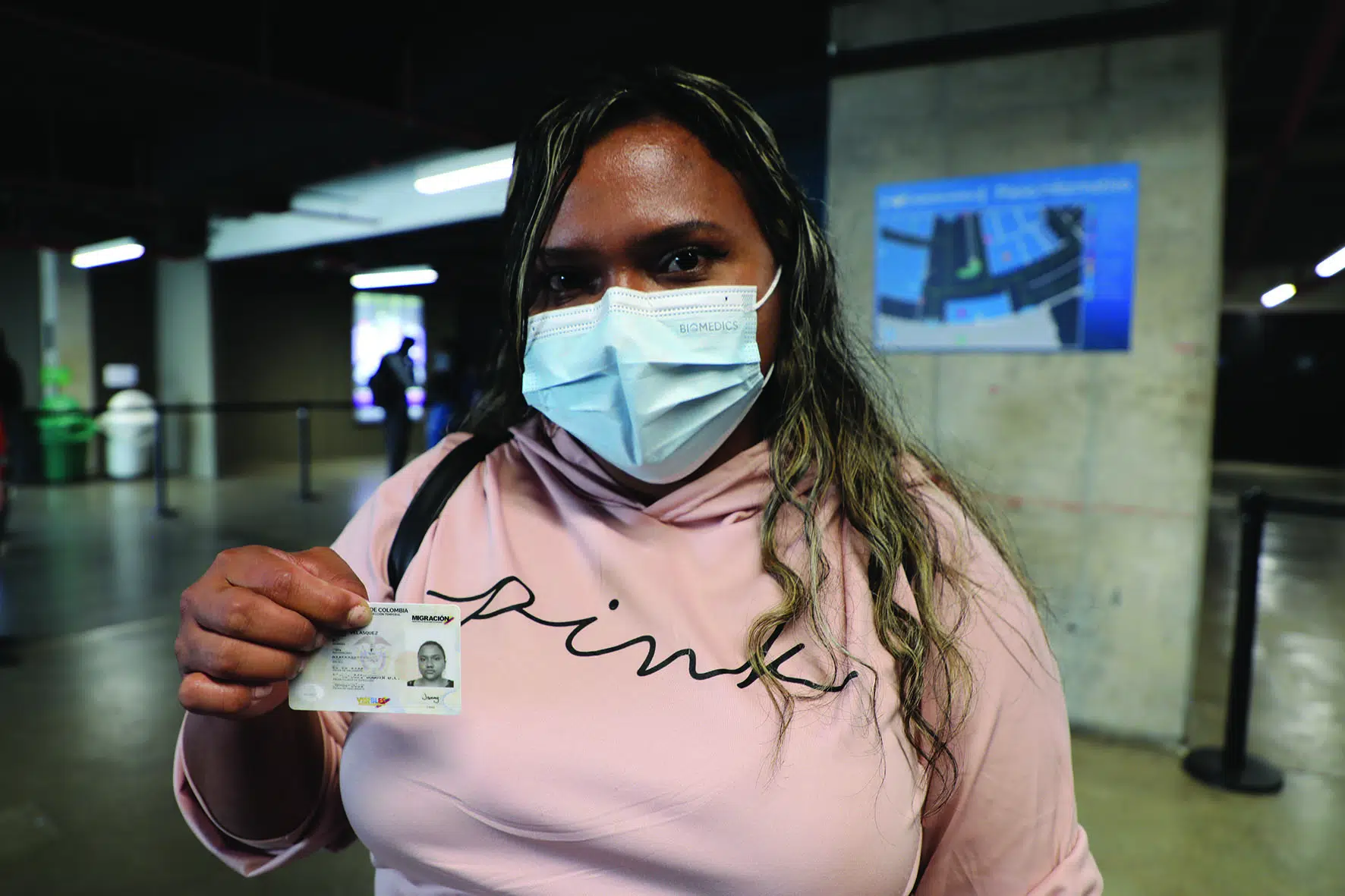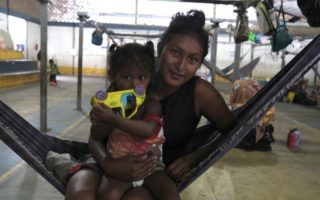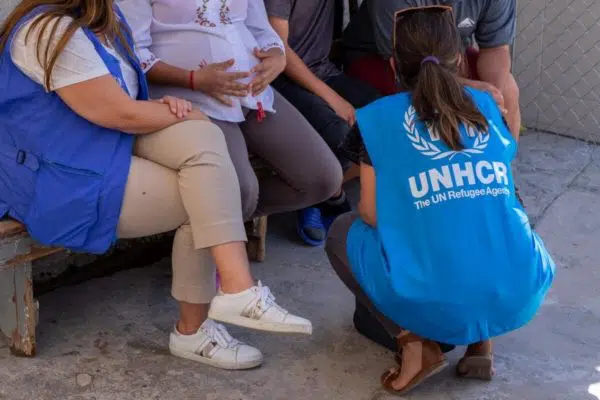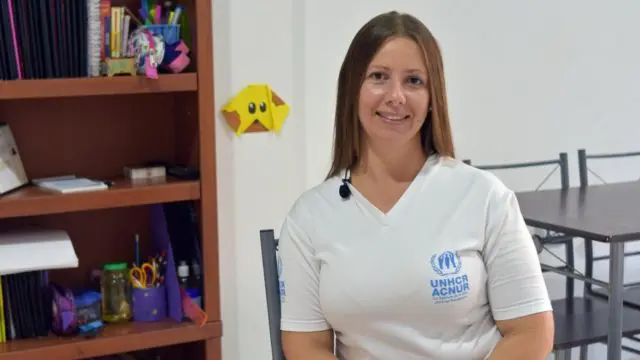UNHCR, partners and host communities provide critical support to Venezuelans.

On February 2022, Janny from Venezuela received her Temporary Protection Permit in Bogotá, Colombia.
At the age of 71, Naxis never imagined being forced to leave Venezuela. “I always planned to live there,” she says. “Retirement was something important for us, to be calm; but then we had to start all over again.”
Naxis is among more than six million Venezuelans who have left their homes in the country, with five million remaining in the Americas. And one of the world’s largest displacement crises shows no signs of slowing anytime soon.
Violence, insecurity, shortages of food, medicine, and a lack of access to essential services have been among the main drivers of the mass exodus over the years. But the onset of the COVID-19 pandemic has trigged a socio-economic crisis that has severely impacted Venezuelan refugees and migrants. Many have lost all sources of income, exposing them to destitution, homelessness, exploitation, and abuse.
“In Venezuela, the situation was very difficult. We couldn’t buy things as before. Everything has changed. It was a different Venezuela. We felt like strangers in our own country,” said Naxis.
Some 35 years ago, Naxis and Gabriel were strangers when they took the same bus to return home together. Gabriel had just completed his classes at the University of Carabobo and Naxis was returning home from the Venezuelan capital of Caracas. In that moment, something led them to speak — and never separate again. They forged a future together, with many unexpected turns. Among them was having to start a new life in Chile.
After initially living with one of their daughters who was already in the country, Naxis and Gabriel managed to become independent, relocating to an apartment in Santiago, Chile’s capital. In Venezuela, the couple previously worked together in the manufacturing and sales of filters for air conditioners. In their Chilean kitchen, they have started a new online business where they sell nuts, eggs, and all-natural products through WhatsApp and social networks.
To help strengthen their business, the couple decided to take part in a course to help grow their digital abilities — a joint initiative of UNHCR and Hogar de Cristo’s Emplea Foundation. The aim of the course is to help promote the social and economic inclusion of refugees and migrants through digital literacy and the development of competencies, skills and abilities in the use and management of information and communication technologies.
“It gave us the possibility to learn how to make a PowerPoint presentation, how to make an expense table, how to make an invoice, how to work through Excel…we can do a complete analysis of a company, we can do so many things,” says Gabriel, 72, who is an industrial engineer by profession.
In 2022, UNHCR’s main priorities have been to focus on support for basic needs. This is especially vital in border areas where UNHCR has stepped up its presence across the region to improve reception conditions for refugees and migrants from Venezuela. UNHCR also works in close partnership with governments across the region to strengthen registration systems in shelters, screening centres and domestic asylum systems.
UNHCR is also working to support government plans for long-term solutions, including regularization schemes and other means of facilitating legal stay. In Colombia, over one million Venezuelans were registered with biometric data to access 10-year Temporary Protection Status, allowing them access to identification documents, employment and state services (including COVID vaccinations).
“I see a wonderful future ahead,” says Janny, holding her Temporary Protection Permit in the Colombian capital of Bogotá. “I have a girl who was born here, and I have plans to buy a piece of land, to build a house, and to set up a business. I am an excellent cook, so that is my purpose, to set up a business.”
At the age of 71, Naxis never imagined being forced to leave Venezuela. “I always planned to live there,” she says. “Retirement was something important for us, to be calm; but then we had to start all over again.”
Naxis is among more than six million Venezuelans who have left their homes in the country, with five million remaining in the Americas. And one of the world’s largest displacement crises shows no signs of slowing anytime soon.
Violence, insecurity, shortages of food, medicine, and a lack of access to essential services have been among the main drivers of the mass exodus over the years. But the onset of the COVID-19 pandemic has trigged a socio-economic crisis that has severely impacted Venezuelan refugees and migrants. Many have lost all sources of income, exposing them to destitution, homelessness, exploitation, and abuse.
“In Venezuela, the situation was very difficult. We couldn’t buy things as before. Everything has changed. It was a different Venezuela. We felt like strangers in our own country,” said Naxis.
Some 35 years ago, Naxis and Gabriel were strangers when they took the same bus to return home together. Gabriel had just completed his classes at the University of Carabobo and Naxis was returning home from the Venezuelan capital of Caracas. In that moment, something led them to speak — and never separate again. They forged a future together, with many unexpected turns. Among them was having to start a new life in Chile.
After initially living with one of their daughters who was already in the country, Naxis and Gabriel managed to become independent, relocating to an apartment in Santiago, Chile’s capital. In Venezuela, the couple previously worked together in the manufacturing and sales of filters for air conditioners. In their Chilean kitchen, they have started a new online business where they sell nuts, eggs, and all-natural products through WhatsApp and social networks.
To help strengthen their business, the couple decided to take part in a course to help grow their digital abilities — a joint initiative of UNHCR and Hogar de Cristo’s Emplea Foundation. The aim of the course is to help promote the social and economic inclusion of refugees and migrants through digital literacy and the development of competencies, skills and abilities in the use and management of information and communication technologies.
“It gave us the possibility to learn how to make a PowerPoint presentation, how to make an expense table, how to make an invoice, how to work through Excel…we can do a complete analysis of a company, we can do so many things,” says Gabriel, 72, who is an industrial engineer by profession.
In 2022, UNHCR’s main priorities have been to focus on support for basic needs. This is especially vital in border areas where UNHCR has stepped up its presence across the region to improve reception conditions for refugees and migrants from Venezuela. UNHCR also works in close partnership with governments across the region to strengthen registration systems in shelters, screening centres and domestic asylum systems.
UNHCR is also working to support government plans for long-term solutions, including regularization schemes and other means of facilitating legal stay. In Colombia, over one million Venezuelans were registered with biometric data to access 10-year Temporary Protection Status, allowing them access to identification documents, employment and state services (including COVID vaccinations).
“I see a wonderful future ahead,” says Janny, holding her Temporary Protection Permit in the Colombian capital of Bogotá. “I have a girl who was born here, and I have plans to buy a piece of land, to build a house, and to set up a business. I am an excellent cook, so that is my purpose, to set up a business.”





